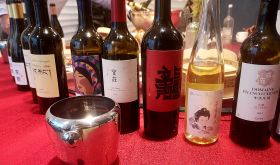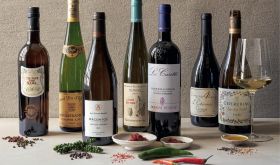It was an open secret that a huge proportion of the once-booming market for wine in China was represented by 'gifts'. In the good old pre-Xi days (two or three years ago), the sky was the limit for wine pricing. The higher the price tag, the easier it was to sell it to someone hoping to make a prestigious 'gift' to a government official – and there are multiple layers of government in China. Chinese producers, who of course understand the Chinese market much better than their foreign counterparts, were releasing wines, typically lavishly packaged even if the liquid itself was distinctly ordinary, at up to 1000RMB (US$160) a bottle and they would sell. The natural tendency of the marketeers was to overprice. But now, as one trade observer put it ruefully, 'wines have to earn their prices' and Chinese wine drinkers have become much cannier buyers – experimenting with a much wider range of labels.
Much to the dismay of those in the hotel and restaurant business, as part of the crackdown, charging corkage for those customers indulging in the common habit of bringing their own bottles has been officially outlawed. There is even a hotline for reporting those still applying such a charge.
At the China Wine Summit in Shanghai earlier this year, all trade commentators were lamenting the massive drop in wine sales. 'Many producers are still obsessed by the previous boom', said Wang Zu Ming, a specialist in wine marketing, 'but this is over, so we can't follow the same old path. Lots of people introduced a blind copy of western wine culture into China, but that doesn't work. Wine is a foreign product to the Chinese. Its roots are really not that deep. We need to focus on self-improvement. The fundamental problems lie inside. There are inherent problems in the wine industry.'
One of them is the huge quantity of low quality wine that was imported in more optimistic times. Warehouses are still piled high with stocks that have been sitting there for two or more years. And at the other end of the scale, no type of wine is worse affected than classed-growth bordeaux. One Shanghai wine merchant told me he had seen first growths piled high, all bought at prices way in excess of current market value – often by opportunist entrepreneurs rather than by those with any real experience of the wine trade. These may be the most valuable casualties of the Chinese wine boom that played such an important part in inflating en primeur prices of Bordeaux 2009s and 2010s, but the great volumes of unsold wines are very much less glamorous than these famous names. And as they are dumped on the market, they are harming the image of wine in general, including that of Chinese wine – whose quality is definitely improving, as it needed to. It does not help that in better times, wine was so systematically faked and mislabelled.
The new austerity measures have resulted not just in a dramatic drop in wine imports but a considerable drop in the production of Chinese wine too – which makes one wonder since Nature was presumably blissfully ignorant of President Xi's decree. According to Li Demei, one of the most respected wine consultants and academics in China, the past stratospheric growth of the wine market in China was 'unhealthy', but according to him 2014 is likely to be even more difficult for the Chinese wine industry than last year because there is still so much wine in the pipeline.
But he is concerned about some of the most obvious sales tactics used in China. When Chinese wine drinkers were polled by the Bordeaux-based trade fair Vinexpo not long ago about their motivations for drinking wine, the most popular response was 'good for health' (followed by, in order, 'help relax', 'friendly atmosphere' and only then 'good taste'). Li Demei is understandably concerned about this: 'we can't say wine is healthy. This is not a solid point. We shouldn't hide the essence of wine'. He is particularly keen that those selling wine in China should not ignore the strength of Chinese food culture and feels that it is dangerous to market wine strictly with western food. And then of course there is the huge challenge of creating a China-specific wine vocabulary, something Cambridge-educated, Beijing-based wine educator Fongyee Walker (who wrote a fascinating account of the recent opening of Chinese Chandon in Ningxia in our Members' forum) has been working on.
The government crackdown has affected those (many) wine companies built on the gifting market specifically but few others are untouched. Even Kerry Wines, an importer which enjoys the cushion of being owned by the Shangri-La hotel group, has been affected. Everyone is trying new directions now. The Chinese distribution arm of the Catalan company Torres, for instance, which has seen its corporate business shrink by 90% in the last two years, has branded many of its 20+ retail outlets around China Everwines and has designed them so that they look like hip Barcelona bars. Some of their best sellers recently have been Joselito hams and, the accessory for the wine collector who has everything, ham stands.
The Chinese-owned wine companies are even more likely to have invested in 'wine lounges', heavily decorated in red velvet and gold, places for businessmen to be pampered. ASC, once American owned and now owned by Suntory of Japan, has been developing special wine lockers in the basement of its seven-floor Wine Residence in Shanghai with its five levels of membership. Those who pay 150,000 RMB (about US$24,000) get a walk-in wine cellar with their name prominently displayed on a brass plaque outside and a private lift straight up to the dining rooms (with resident chefs) on the top floors. (It was this membership level that sold out immediately.)
Wine storage is a crucial aspect of the wine scene in China, not least because so few Chinese homes have much space. Because import taxes into mainland China are so high but are zero in Hong Kong, mainly high-end Chinese wine collectors keep their wine in Hong Kong, where the number of specialist wine storage facilities, some of them in the most unlikely high-rise blocks, has mushroomed. This has helped to nurture the extraordinary growth in wine auctions in the ex-colony, which have overtaken those of Europe and North America.
The focus of the world of wine may seem to have moved definitively east, but the market is now mature enough to have its own problems.
China loses its shine

This article has also been syndicated.
China was for long seen by wine exporters as El Dorado – a mysterious place that promised golden rewards if one could but crack the code. But that is now definitively unravelling amid signs that it is all very much more complicated and less promising than that, particularly now that President Xi Jinping has so successfully enforced a crackdown on bribery and luxury goods.

This February, share what you love.
February is the month of love and wine. From Valentine’s Day (14th) to Global Drink Wine Day (21st), it’s the perfect time to gift wine knowledge to the people who matter most.
Gift an annual membership and save 25%. Offer ends 21 February.
- Access 289,553 wine reviews & 15,911 articles
- Access The Oxford Companion to Wine & The World Atlas of Wine
- Access 289,553 wine reviews & 15,911 articles
- Access The Oxford Companion to Wine & The World Atlas of Wine
- Early access to the latest wine reviews & articles, 48 hours in advance
- Access 289,553 wine reviews & 15,911 articles
- Access The Oxford Companion to Wine & The World Atlas of Wine
- Early access to the latest wine reviews & articles, 48 hours in advance
- Commercial use of up to 25 wine reviews & scores for marketing
- Access 289,553 wine reviews & 15,911 articles
- Access The Oxford Companion to Wine & The World Atlas of Wine
- Early access to the latest wine reviews & articles, 48 hours in advance
- Commercial use of up to 250 wine reviews & scores for marketing
More Free for all




More from JancisRobinson.com








